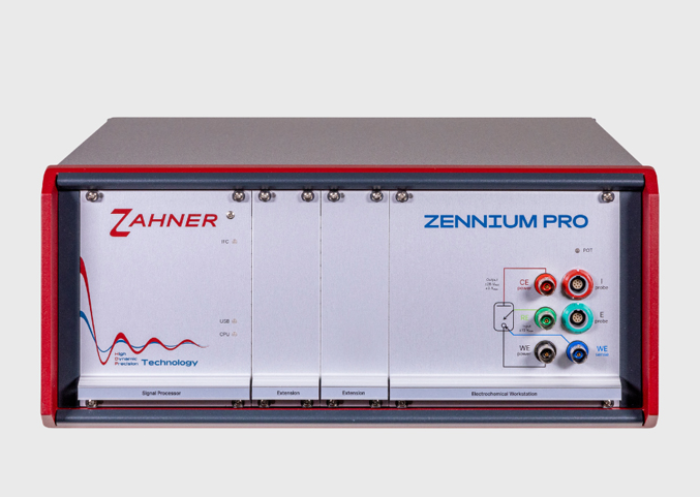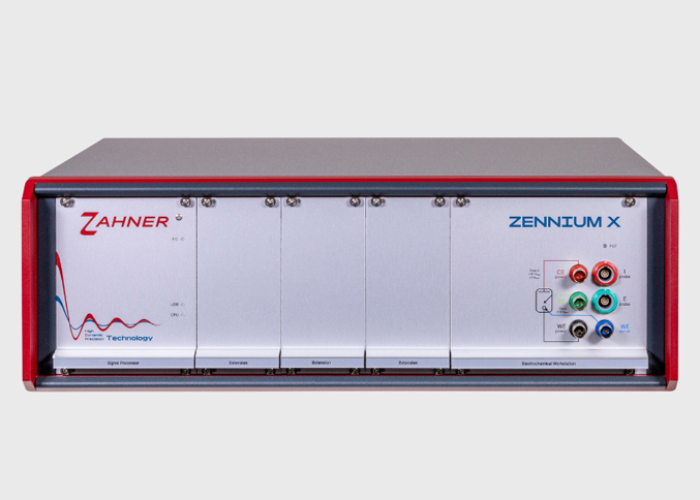Modular
Modular potentiostat systems offer flexible channel configurations, optional EIS, and wide current ranges for diverse electrochemical research across multiple applications.

Zennium PRO
- DC Voltage Scan Range : ±15 V
- Max Current: ±3 A over 12 current ranges
- Min Measurable Current: ±1 pA
- EIS Frequency Range: from 10 µHz to 8 MHz

Zennium X
- DC Voltage Scan Range: ±15 V
- Max Current: ±4 A over 12 current ranges
- Min Measurable Current: ±0.5 pA
- EIS Frequency Range: from 10 µHz to 12 MHz
Modular Potentiostats
Modular potentiostats are advanced electrochemical instruments designed with a modular architecture that allows flexible configuration and scalability. Unlike traditional single-channel potentiostats that control one electrochemical cell at a time, modular potentiostats can be expanded by adding stackable modules or boards to operate multiple channels simultaneously. This design supports a wide range of experimental setups, from controlling multiple independent electrochemical devices to managing a single device with multiple working electrodes.
A potentiostat controls the voltage difference between a working electrode and a reference electrode in an electrochemical cell while measuring the current flowing between the working and counter electrodes. Modular potentiostats extend this principle by enabling multiple such channels to operate independently or in coordination, allowing complex, multi-electrode experiments with high precision.
-
Operate multiple electrochemical cells or multi-electrode systems in parallel.
-
Support ranges from 8 up to 64 channels or more by stacking circuit boards.
-
Each channel independently controls voltage and measures current.
-
Each channel has its adjustable voltage source (e.g., ±4 V).
-
The current measurement capability per channel is up to 1.5 A.
-
Enables simultaneous, independent experiments or coordinated multi-electrode control.
-
Base unit provides power and communication.
-
Stackable boards add channels, allowing customization to fit experimental needs.
-
Future-proof and adaptable by adding or upgrading modules.
-
External control modes for interfacing with software and algorithms (e.g., machine learning).
-
Includes Frequency Response Analyzers (FRA) for electrochemical impedance spectroscopy (EIS).
-
Consolidates multiple channels into one chassis.
-
Reduces laboratory footprint and cost per channel compared to multiple single-channel instruments.
-
Modular booster boards reduce reliance on bulky external devices.
-
Large-scale or long-duration experiments, such as energy storage research.
-
Involving multiple simultaneous measurements.
-
Complex multi-electrode systems require coordinated control.
-
Sensor development, battery research, electrosynthesis, and more.
-
A potentiostat controls the voltage between electrodes and measures current in an electrochemical cell.
-
Extend this to multiple channels with independent control and measurement.
-
They offer a customizable and scalable platform for advanced electrochemical research.
-
Modular design offers flexibility, cost-effectiveness, and space efficiency without compromising precision.
-
Ideal for complex, multi-electrode experiments and large-scale electrochemical studies.
-
: Channels can be equipped with different measurement or booster boards tailored to specific experiments.
-
: Run multiple independent or grouped experiments simultaneously, saving time and improving repeatability.
-
: Multiple channels in one chassis reduce lab footprint and cost per channel.
-
: Modify experiment parameters on-the-fly during ongoing measurements to optimize data quality.
-
: Support remote operation and integration with lab automation systems.
If you want, I can also provide detailed comparisons between modular potentiostat models or suggest which modular system fits your research needs!
